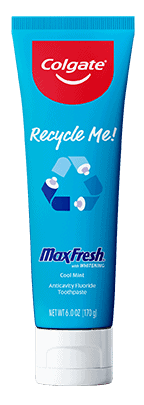
Photo courtesy of Colgate

Colgate-Palmolive has launched a recyclable toothpaste tube with limited edition messaging to build recycling awareness among consumers as well as material recovery facility (MRF) operators, reprocessors and other recycling stakeholders. The New York-based consumer products firm says the tube is the first to be recognized as recyclable by external recycling authorities.
The toothpaste tube is made from high-density polyethylene (HDPE,) similar to milk and detergent bottles, and there is no rinsing, cutting or cleaning required before placing the tube into a recycling bin. The company says it chose HDPE because of its high recycling rate—about 30 percent in the U.S. By combining different layers of HDPE laminate at varying thicknesses, Colgate’s engineers were able to produce a tube easier to squeeze than typical products made from HDPE.
Colgate initially launched a prototype of the tube in the U.S. in 2020 under its Tom’s of Maine brand. The packaging was recognized by the Association of Plastic Recyclers (APR), Washington, after demonstrating it could navigate screens and conveyor belts at MRFs and could be repurposed after recycling. “The Association of Plastic Recyclers appreciated the opportunity to partner with Colgate on this important project,” APR President Steve Alexander said in 2020. “Tubes are one of the most widely used forms of plastic packaging that still cannot be recycled. There is a lot of work ahead, but we believe Colgate is off to a great start.”
The tube also features limited edition “Recycle Me!” graphics to alert consumers of the product’s recyclability. The messaging will be found on select tubes of Colgate toothpastes and the company expects to expand the packaging to the rest of its toothpaste line by 2023 in the U.S. and globally by 2025.
Colgate says the goal of the “Recycle Me!” messaging is to build awareness of the recyclable tubes. Since most of the world’s toothpaste tubes have been made with a mix of materials, they have not traditionally not been recycled.
“We want to lead in waste reduction and, in particular, making toothpaste tubes a part of the circular economy,” says Dana Medema, vice president and general manager of oral care for Colgate-Palmolive in North America. “The ‘Recycle Me!’ tube is designed to educate and engage consumers and the recycling community who are both essential to progress and we are excited to initiate and learn from our upcoming pilot program.”
The pilot program is being developed in partnership with peer companies and leading MRF operators and reprocessors in the U.S. It will focus on one county or municipality to test how educational efforts can build toothpaste tube recycling rates and assess the quality of the tube material that is collected for reprocessing. The company says it will use the data to define best practices for tube recycling to be shared with communities and recyclers around the country.
Last year, Dow Packaging & Specialty Plastics, Midland, Michigan, also announced it had developed a recyclable toothpaste tube using high-performance polyethylene-based technology and removing the aluminum layer of the tube, which has made toothpaste tubes difficult to recycle.
Colgate-Palmolive has revamped its packaging before, most recently in March 2021 when it relaunched its Palmolive Ultra dish soap in 46-ounce and smaller bottles in the U.S. and 20-ounce and smaller bottles in Canada made with 100 percent postconsumer resin (PCR). According to the company, that transition as well as the newly launched recyclable toothpaste tubes will contribute to its commitment to design and deliver zero-waste plastic solutions for all products, including eliminating one-third of its new plastics by 2025.Latest from Recycling Today
- Orion ramping up Rocky Mountain Steel rail line
- Proposed bill would provide ‘regulatory clarity’ for chemical recycling
- Alberta Ag-Plastic pilot program continues, expands with renewed funding
- ReMA urges open intra-North American scrap trade
- Axium awarded by regional organization
- Update: China to introduce steel export quotas
- Thyssenkrupp idles capacity in Europe
- Phoenix Technologies closes Ohio rPET facility





